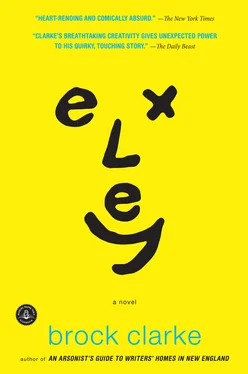On that subject: I begin by asking M. to tell me the circumstances behind his father’s going to Iraq. I make this request as though holding the assumption that the father truly is in Iraq, although I do not, in fact, actually assume that.
“My dad,” M. says immediately, as though waiting for me to ask the question, “went to Iraq on Friday, the twentieth of March, 200–.” This is how Miller speaks the date: “Two thousand blank.” Odd — odd and, indeed, quite strange — although I don’t say so. Instead, I ask M. how he can be so certain about the date.
“Because it was the last day of school before spring vacation,” he says. I am about to ask him how he can be so certain it was the last day of school, but he anticipates the question. “I remember it was the last day of school because I didn’t have to bring any books or folders or notebooks home. Just an empty backpack. I was swinging my empty backpack around by one of its loops as I walked home. It made a whistling sound as I swung it, and then it made a crying sound. I stopped swinging the backpack and listened. The crying sound was still there. I walked toward it, toward my house, which was less than a block away. When I got to the house next to ours, I could see through the neighbors’ hedge that Mother was standing in our driveway, crying.”
“Crying?” I ask.
“Really crying,” M. says. “You could see the tears running down her face, into her mouth. I’d never seen or heard her cry. It scared me. It made me not want to get too close to her, so I stayed on our neighbors’ side of the hedge.”
“Your mother was crying?” I ask again, unable to get past the image. I can feel my eyes water at the thought of hers watering. But M. appears not to hear me. His eyes are closed. It strikes me that this story is something he has memorized — memorized and, indeed, committed to memory .
“My dad was in his Lumina, which was running and pointed down the driveway, toward the street. The driver’s-side window was down and he leaned out of it and said, ‘Maybe I should go to Iraq, too.’”
“How did he say those words?” I ask.
M. opens his eyes and looks at me quizzically. “With his mouth,” M. says.
“No, no,” I say. “In what tone? In what manner? Did he emphasize the word ‘should’? The word ‘I’? Did the sentence sound like a threat? A promise?”
“It sounded sad,” M. says, closing his eyes again.
“Sad,” I repeat. “And what did your mother say in response?”
“‘T.,’” M. says. T., I know, is the boy’s father’s name. M. says the name in his own voice, but I assume he’s repeating what his mother said. M. gulps once, twice, as though trying to catch his breath, and I wonder if the gulping is his or his mother’s. Perhaps it is both. “ ‘Please. ’”
I do not ask how she said the word “please,” because I can hear her voice in his, can see her lovely wet eyes telling M.’s father to stay. I wonder how anyone could go when those eyes said, Stay . But evidently M.’s father went anyway. “Then my dad rolled up his window, pulled out of the driveway, and then drove away.”
“Did he see you standing there?” I ask.
“No,” M. says. “But Mother did. She’d walked to the end of the driveway to look at my dad driving away from her. And then she turned to go back into the house and saw me behind the bush. Then she stopped crying, smiled, and asked, ‘How was your last day of school?’”
“That was most considerate of her,” I say. “Most considerate and, indeed, most thoughtful .”
M. opens his eyes and gives me the look that all my patients give me when they tire of saying “Whatever” with their mouths and instead say it with their eyes. Then he closes them once more and says, “So I asked her why my dad was going to Iraq.”
“And her answer?”
“She said, ‘Lots of people are going to Iraq, M., but your dad isn’t one of them.’ And then she turned around and went into the house.”
M. opens his eyes and considers me as I consider his story. One aspect of the tale seems clear enough: M.’s mother and father had a fight, and his father left them because of it. Either M. is omitting the reason for the fight, or he doesn’t know the reason. But married persons only argue over two things: money and sexual infidelity. Every mental health professional knows this, even those, like me, who do not specialize in the mental health of married persons, and who do not have great piles of money, and who have never been married and who have never been sexually unfaithful and who, frankly, have never had much of an opportunity to be sexually unfaithful. But regardless, that part of the tale seems explicable enough. Other aspects of M.’s story seem inconsistent — M. knows the exact month and date of his father’s departure but can’t, or won’t, specify the year? — but are most likely neither here nor there: I suspect, as with the cause of M.’s parents’ fight, we will “get to the bottom of it” soon enough. But the most troublesome aspect of M.’s tale is his belief that his father’s saying that “maybe” he “should” go to Iraq constitutes proof that the father, in fact, did go to Iraq. Does M. really believe this, or is he merely pretending to? And if the latter, does he know he’s pretending, or does he think he’s telling the truth? I decide to press M. on the matter. “So that’s how you know your father went to Iraq?” I ask him. “Because he said that ‘maybe’ he ‘should’ go there?”
“You sound just like my mother,” M. says. I thrill to hear those words — I sound like M.’s mother! I have something in common with M.’s mother! — but M. doesn’t appear to feel similarly. His red cheeks go pale and his blue eyes tear up; he runs a hand through his hair, sending it even further ceilingward. When I ask if he’s “all right,” he doesn’t answer. This is both the comfort and the terror of the juvenile mind. One knows that if the juvenile mouth is not moving, then the mind is; but one does not necessarily know what that mind is moving away from or toward. “What are you thinking?” I ask M., as I ask most of my patients when I want to know their thoughts. Most of my patients will, in fact, tell me, a phenomenon I described two years ago at the North Country Mental Health Professionals’ annual meeting in my speech “‘Ask and You Shall Receive’: A Commonsensical Approach to the Juvenile Mind.” But not M.; he simply stares at me with his faint blue eyes. Those eyes are most changeable: one moment they seem unbearably sad, and the next full of danger; one moment M. looks like he’s heartbroken, the next he looks like the hangman. In short, M. appears to be no ordinary patient, just as M.’s mother appears to be no ordinary patient’s mother. As for M.’s father, it is uncertain what he is and what he isn’t. Thus far, he is an enigma, in deed and in word. “Other than your father saying he might go to Iraq,” I ask, “why do you think he would?”
“Would what?”
“Go to Iraq.”
“I have no idea,” M. says quickly, too quickly. Yes, you do , I think but do not say. Instead, I give M. an assignment. I ask him to write down something important about his father.
“Something important?” he asks.
“Something you remember about him,” I say. “Something you love. Some lesson he’s taught you. I’d like you to write this down and then share it with me during our weekly session.”
M. nods like he thinks this is something he can do. “When?” he asks.
“Whenever you feel like it,” I say, and he nods again. This seems like progress, of a sort. But still, something about M.’s story and his father’s role in it nags at me.
Читать дальше












